2005 年江苏南京农业大学基础英语考研真题
Part I Reading Comprehension
(65 points in all)
Directions: Read the following 7 passages and answer the questions after each one.
For the first 4 passages, you are expected to answer each of the questions (defined
by one question mark) in one simple sentence (with one predicate verb) or phrase. For
the last 3 passages, answer the follow-up questions as briefly as possible. You will
be penalized for wordy answers or exceeding the limit.
Passage One
Our two pet donkeys were reliable watchmen, and their hearing was as sharp as their
eyesight. I have seen them many a time look up from the grass they were eating and
stare hard into the distance with ears raised; and in a minute or so I would see someone
coming down the road towards the beach or observe a figure moving in a field a long
way away.
When something unusual happened, Fred, the younger animal, would make so much noise
that he could be heard in the next village and beyond. Obviously this could be
embarrassing when the weather was still, for not everyone enjoys the sound of a donkey
in full cry.
At night both donkeys were usually silent. They were undisturbed by the wild
animals hunting in the fields after dark. They remained sleepily relaxed. Yet I was
sure that they would always raise the alarm if there was a stranger about, or some
activity which puzzled them. One clear August night, for instance, I was woken up around
three in the morning by Fred making a great deal of noise. It was a very quiet night
and I immediately thought of all the people in the neighborhood who might also have
been awakened by him. It was a terrible noise, and it went on and on, and so I realized
that something very unusual was bothering him. Then he stopped—and I heard voices.
On still nights we often heard the voices of the crews of fishing boats passing
across the bay, sometimes speaking in French, but they soon faded away into the distance.
On this night they did not fade away. And as I lay in bed realizing that they had gone
on for far too long to belong to a moving boat, I knew that I had to get up and
investigate.
I pulled on some clothes, went outside, and shone my torch into the field by the
cottage where I had put the donkeys. The light shone on Fred who was standing with
his head facing towards the sea, ears upright like a V sign, showing such an intense
interest in what was mysteriously happening that I felt like saying to him, “here,
take the torch, go and find out what it’s all about.”
1. Why were the writer’s two donkeys good at keeping watch? (2 points)
2. When the writer was woken up at 3:00 a.m., what did he do? (2 points)
�
3. When he went outside what did he do? (2 points)
4. What had alarmed the donkeys that particular August night? (2 points)
Passage Two
It is time for bed. Behind me is a long horizontal window several feet up in the
wall. As I go to the door I will have to look towards it and see my face reflected
in the black glass as in a mirror. I have never suffered from night fears. I was never,
that I can remember, afraid of the dark as a child. My mother early impressed upon
me that fear of the dark was foolish and God-trusting people did not need to be worried
about it; in any case I had found my parents a complete defense against every terror.
It is just that, as I now suddenly realize, this is the first time in my life that
I have been really alone at night. My childhood home, lodgings when I was in the theater,
London flats, hotels, rented apartments in capital cities: I have always lived
surrounded by human presences behind walls. And even when I lived in a hut for a period
I was never alone. This is the first house which I have owned and the first time that
I have really been by myself. Is this not what I wanted? Of course the house is full
of little straining noises, even on a windless night, any old house is, and cold air
moves through it from loose window frames and badly-fitting doors. So it is that I
can imagine, as I lie in bed at night, that I hear soft footsteps in the rooms on the
floor above me or that the curtains on the landing are moving gently because someone
has passed through them.
Perhaps this is a foolish moment, so late at night, to choose to think about what
happened yesterday, but it has come suddenly and very clearly into my head. I was
sitting, with this notebook beside me, upon the rocks under the cliff, and looking
out over the bay. The sun was shining, the sea was calm. Shortly before I had been
looking into a rock pool and watching a long reddish, slightly hairy sea-worm which
had curled itself up tightly before disappearing into a hole. I sat up and settled
myself facing the sea, shading my eyes against the sun, then, not at once but after
about two minutes, as my eyes became accustomed to the bright light I was sure that
I saw a monster rising from the waves.
5. Thinking about his childhood, what does the man say about himself? (2 points)
6. Whose house is it? What happens in this house at night? (2 points)
7. Where has the man always lived? (2 points)
8. What had the man been doing on the beach the day before? (2 points)
Passage Three
It was on one of the hottest August days—the fourth, and at twelve o’clock exactly,
for church clock was striking the hour—that a short, heavily-built woman of about
fifty, carrying a shopping bag, came out from the darkness of an old storehouse where
she worked every morning as a checker, and set off along the narrow gray street to
a bus-stop. Most of the factories and offices in the town were closed for two weeks
but the storehouse, which held food-stuffs and other goods that did not keep, had
�
remained open during the holidays. The heat, made worse by the heavy smell of petrol
from the main street nearby and undisturbed by the slightest current of cooler air,
enveloped her. She was neither dressed nor built for energetic activity on a hot day,
being very short indeed, and fat, so that she had to roll a little in order to get
along. Her tight black dress was worn without a belt or any ornaments other than a
large metal cross, well fingered but of no special value, which hung on a white ribbon
around her neck. Her cracked shoes made loud footsteps in the silence of the empty
street of closed buildings. The worn old bag she carried caused her to lean over
slightly to her right as she walked, but it was clear that she was used to carrying
such heavy weights.
Reaching her usual bus stop, she put down her bag and rested. Then, suddenly
conscious of being watched, she turned quickly round and looked sharply upward at the
tall man behind her.
He was the only other person waiting, and indeed, at that moment, the only other
person in the street. She had never spoken to him, yet his face was already familiar
to her: so big, so uncertain, so sweaty. She had seen it yesterday, and the day before,
and for all she knew, the day before that as well. For the last three or four days
anyway, this great nervous lump of a man, waiting for a bus or hanging about on the
footpath outside the storehouse, had become a figure of the street for her; and what
was more, a figure of a certain definite type, though she had yet to put her finger
on exactly which type it was. More than once, she had felt his interest in her and
she had wondered whether he was a policeman.
9. Why were there so few people about in this particular street at midday? (2 points)
10. Why did the woman turn around? (2 points)
11. Why did the woman recognize the man by the bus-stop? (2 points)
Passage Four
France Wingate had not been to Tockley for many years—she could not remember how
many. Her grandfather had died when she was fourteen. Her grandmother had died ten
years later, but she had been out of the country at the time and had not gone to the
funeral. In fact, after her grandfather’s death she had hardly visited Tockley at
all, she now remembered guiltily: the place had begun to depress her. She could no
longer stand the slow pace, the quietness, the emptiness, the very things that had
charmed her as a small child, and her grandmother had turned odd and difficult to live
with, even more bad-tempered than she had been when younger, even more given to sudden
bursts of anger and long silences.
She thought of it, then as now, as “going to Tockley” but the house wasn’t really
in Tockley: it was about six miles out, a distance that had then seemed enormous, as
it had to be traveled by bus. The town was a medium-sized ordinary town, with much
light industry; it was easy enough to get to, but it was the kind of place one goes
through, rather than stops at. Frances had booked a room at the Railway Hotel, because
it was next to the station, and because her guide-book said it was well run and that
�
the food was quite good. She looked out of the window of the train and wondered what
she remembered of the town. Little, she thought. It hadn’t meant much to her
grandparents: they went there once a fortnight to shop, depending otherwise on the
shop in the nearest village and on what they produced in their own garden. There was
a famous church, rising out of the flat plain, which could be seen for miles: her
guide-book described it with some excitement, but she didn’t remember that she had
ever been in it. She remembered the wool shop, the shoe shop, the grocer’s a little.
It had probably all changed by now.
The cottage, too, had probably changed. She remembered it in great detail. It had
been the one fixed point in her childhood; for her parents had always been moving from
the house to another as her father had been promoted from one academic post to the
next; five year here, three years there, had been the pattern. Granny Ollerenshaw,
in the cottage, had been immovable, unchanged and unchanging. They called it Eel
Cottage: over the doorway there was a square sign which announced EEL 1779. For years
Frances had thought that this meant the fish which lived in muddy ditches; only later,
looking more closely, did she realize that the mysteriously word must have been the
builder’s or owner’s initials. The cottage was a basic cottage, the kind that small
children draw: low, a door in the middle, two windows downstairs, two windows upstairs.
It was built of red brick, the brick of the district, with a red-tiled steep roof.
12. Why didn’t Frances remember very much about Tockley? (2 points)
13. Where was Frances’s grandparents’ house? (2 points)
14. Why was Frances’s grandparents’ house called “Eel Cottage”? (2 points)
15. Why did Frances stop visiting the cottage regularly? (2 points)
16. Why had her grandparents’ house meant a lot to Frances as a child? (2 points)
Passage Five
In the early 1950's, historians who studied preindustrial Europe (which we may
define here as Europe in the period from roughly 1300 to 1800) began, for the first
time in large numbers, to investigate more of the preindustrial European population
than the 2 or 3 percent who comprised the political and social elite: the kings,
generals, judges, nobles, bishops, and local magnates who had hitherto usually filled
history books. One difficulty, however, was that few of the remaining 97 percent
recorded their thoughts or had them chronicled by contemporaries. Faced with this
situation, many historians based their investigations on the only records that seemed
to exist: birth, marriage, and death records. As a result, much of the early work on
the nonelite was aridly statistical in nature; reducing the vast majority of the
population to a set of numbers was hardly more enlightening than ignoring them
altogether. Historians still did not know what these people thought or felt.
One way out of this dilemma was to turn to the records of legal courts, for here
the voices of the nonelite can most often be heard, as witnesses, plaintiffs, and
defendants. These documents have acted as "a point of entry into the mental world of
the poor." Historians such as Le Roy Ladurie have used the documents to extract case
�
histories, which have illuminated the attitudes of different social groups (these
attitudes include, but are not confined to, attitudes toward crime and the law) and
have revealed how the authorities administered justice. It has been societies that
have had a developed police system and practiced Roman law, with its written
depositions, whose court records have yielded the most data to historians. In
Anglo-Saxon countries hardly any of these benefits obtain, but it has still been
possible to glean information from the study of legal documents.
The extraction of case histories is not, however, the only use to which court
records may be put. Historians who study preindustrial Europe have used the records
to establish a series of categories of crime and to quantify indictments that were
issued over a given number of years. This use of the records does yield some information
about the nonelite, but this information gives us little insight into the mental lives
of the nonelite. We also know that the number of indictments in preindustrial Europe
bears little relation to the number of actual criminal acts, and we strongly suspect
that the relationship has varied widely over time. In addition, aggregate population
estimates are very shaky, which makes it difficult for historians to compare rates
of crime per thousand in one decade of the preindustrial period with rates in another
decade. Given these inadequacies, it is clear why the case history use of court records
is to be preferred.
17. What is one of the drawbacks that most historians who studied preindustrial Europe
before the early 1950’s have? (2 points)
18. According to the passage, what work have historians done that indicates the manner
in which those in power apportioned justice? (3 points)
19. In what way could the historians have made much of their early work on the European
nonelite of the preindustrial period more illuminating? (3 points)
20. Are the indictments for crime in Europe in the preundustiral period an accurate
indication of the extent of actual criminal activity? Why or why not? (3 points)
21. What can you infer from the passage would probably most aid a historian who wished
to compare crime rates per thousand in a European city in one decade of the fifteenth
century with crime rates in another decade of that century? (3 points)
Passage Six
Like our political society, the university is under severe attack today and perhaps
for the same reason; namely, that we have accomplished much of what we have set out
to do in this generation, that we have done so imperfectly, and while we have been
doing so, we have said a lot of things that simply are not true. For example, we have
earnestly declared that full equality of opportunity in universities exists for
everyone, regardless of economic circumstance, race or religion. This has never been
true. When it was least true the assertion was not attacked. Now that it is nearly
true, not only the assertion but the university itself is locked in mortal combat with
the seekers of perfection.
In another sense the university has failed. It has stored great quantities of
�
knowledge; it teaches more people; and despite its failures, it teaches them better.
It is in the application of this knowledge that the failure has come. Of the great
branches of knowledge—the sciences, the social sciences and humanities—the sciences
are applied sometimes almost as soon as they are learned. Strenuous and occasionally
successful efforts are made to apply the social sciences, but almost never are the
humanities well applied. We do not use philosophy in defining our conduct. We do not
use literature as a source of real and vicarious experience to save us the trouble
of living every life again in our own.
The great tasks of the university in the next generation are to search the past
to form the future, to begin an earnest search for a new and relevant set of values,
and to learn to use the knowledge we have for the questions that come before us. The
university should use one-fourth of a student’s time in his undergraduate years and
organize it into courses which might be called history, and literature and philosophy,
and anything else appropriate and organize these around primary problems. The
difference between a primary problem and a secondary or even tertiary problem is that
primary problems tend to be around for a long time, whereas the less important ones
get solved.
One primary problem is that of interfering with what some call human destiny and
others call biological development, which is partly the result of genetic circumstance
and partly the result of accidental environmental conditions. It is anticipated that
the next generation, and perhaps this one, will be able to interfere chemically with
the actual development of an individual and perhaps biologically by interfering with
his genes. Obviously, there are benefits both to individuals and to society from
eliminating, or at least improving, mentally and physically deformed persons. On the
other hand, there could be very serious consequences if this knowledge were used with
premeditation to produce superior and subordinate classes, each genetically prepared
to carry out a predetermined mission. This can be done, but what happens to free will
and the rights of the individual? Here we have a primary problem which will still exist
when we are all dead.
Of course, the traditional faculty members would say, "But the students won't learn
enough to go to graduate school." And certainly they would not learn everything we
are in the habit of making them learn, but they would learn some other things. Surely,
in the other three-quarters of their time, they would learn what they usually do, and
they might even learn to think about it by carrying new habits into their more
conventional courses. The advantages would be overwhelmingly greater than the
disadvantages. After all, the purpose of education is not only to impart knowledge,
but to teach students to use the knowledge which they either have or will find, to
teach them to ask and seek answers for important questions.
22. What does the author suggest is the university’s greatest shortcoming? (2 points)
23. According to the author’s presupposition, what kind of course will the reader
regard a course in literature as? (2 points)
24. Raise two questions (not the same as discussed in the passage) that the author
�
would most likely consider primary questions. (3 points)
25. As regards to the use of scientific techniques to change an individual’s genetic
makeup, would the author agree with the statement that society has no right to use
such techniques without the informed consent of the individual? Why or why not?
(3
points)
26. What field of study does the problem discussed in the passage belong to? What is
the primary purpose of the passage? (3 points)
Passage Seven
Throughout China's long history, the intellectuals considered themselves the
preservers and transmitters of the precious culture of their country. Their road to
success was not always smooth, but the intellectuals were strengthened by the belief
that once they won recognition as first-rank scholars they would be rewarded with
position, honor, and lasting fame.
The attitude of the Chinese communists toward intellectuals is in large measure
influenced by their ideology. While workers and peasants were raised to the top
position, the intellectuals were downgraded because they were considered products of
bourgeois and feudal education and perpetuators of bourgeois ideology. The communist
policy was to “absorb and reform” the intellectuals.
The intellectuals were made to undergo thorough thought remodeling to be
“cleansed” of bourgeois ideas and attitudes. The remodeling began with relatively
mild measures, such as “political study” and “reeducation.” The policy became
increasingly oppressive in the 1950s when intellectuals were pressured to take part
in the class struggle of the land reform and in orchestrated attacks on university
professors, writers, artists, and intellectuals in different walks of life. The
intellectuals, especially those who had studied in Western schools or had been employed
by Western firms, were forced to write autobiographies giving details of their
reactionary family and educational background, pinpointing their ideological
shortcomings, and confessing their failings.
Following Khrushchev's 1956 speech criticizing Stalin, violence broke out in
Poland and Hungary. This worried Mao, who agreed to try Premier Zhou Enlai's proposal
to relax the Communist Party's pressure on intellectuals. This resulted in the slogan
“Let a hundred flowers bloom, a hundred schools of thought contend.” Mao indicated
that intellectuals would be allowed to speak freely.
The result, however, was unexpected and shocking. Once they began to speak freely,
the intellectuals unleashed a torrent of angry words, fierce criticisms, and open
attacks upon the repressive measures under which they had suffered. Some recanted the
confessions they had made under duress; others went so far as to denounce the Communist
Party and its government. To avoid a more serious outburst of explosive ideas and
emotions, the government decided to put a stop to the “blooming–contending.”
Outspoken critics were labeled rightists, and an anti-rightist campaign not only
silenced the intellectuals but also placed them under more restrictive controls than
before. The “flowers” wilted and the “schools” were muffled.
�
During the Cultural Revolution, Mao's criticism of the intellectuals instigated
young radicals all over the country to join the struggle against the intellectuals.
Students were urged to slap and to spit at their teachers; insult, humiliation, and
torture were common. Some teachers chose suicide. Others were sent to May 7th cadre
schools or to the countryside to be reformed by labor.
27. Write an abstract of this passage within 60 words. (6 points)
Part II Vocabulary (1 point each, 30 points in all)
Section A
Directions: There are 15 sentences in this section. Each sentence has a word underlined.
There are four words or phrases beneath each sentence. Choose the one word or phrase
beneath each sentence which would best keep the meaning of the original sentence if
it were substituted for the underlined part. Write your choice (A, B, C or D ) on your
answer sheet.
B. competent
D. profound
B. slippery
B. postpone
B. hesitant
C. haughty
D. prudent
B. thoughtful
C. true
C. sleepy
D. improper
B. condemnation
C. praise
D. expectation
C. enthusiastic
D. irritable
1. The young man was so bashful that he did not speak to the pretty girl.
A. shy
2. My brother was very fractious when I asked him to help clean the kitchen.
A. agreeable
3. Nancy has had a perverted sense of righteousness since her childhood.
A. twisted
4. Mark Anthon’s eulogy of Caesar at his funeral is memorably recorded in a play by
Shakespeare.
A. admiration
5. The little boy had had a long day; he was feeling drowsy.
A. exhausted
6. Although the ministers had agreed to defer the action, the king ordered otherwise.
A. prolong
7. The salad dressing we had at the restaurant was very unsavory.
A. delicious
8. As soon as the board of elections promulgates the list of candidates, a ballot is
prepared.
A. officially declares
C. quickly contacts
9. The proposed environmental amendment has not yet been ratified by all fifty states.
A. revised
10. In his statements to the press, the administer was consistently equivocal.
A. confident
11. During the war, the shipping lanes proved to be vulnerable to attack.
A. feasible
12. The man was afraid to eat the meat because it looked tainted.
A. rotten
B. informally discusses
D. critically reviews
C. tasteless
D. delicious
B. futile
C. susceptible
B. frank
C. reasonable
C. proceed
D. soften
B. salty
C. disgraceful
D. distasteful
C. judged
D. renewed
D. impossible
B. approved
B. rugged
D. ambiguous
�
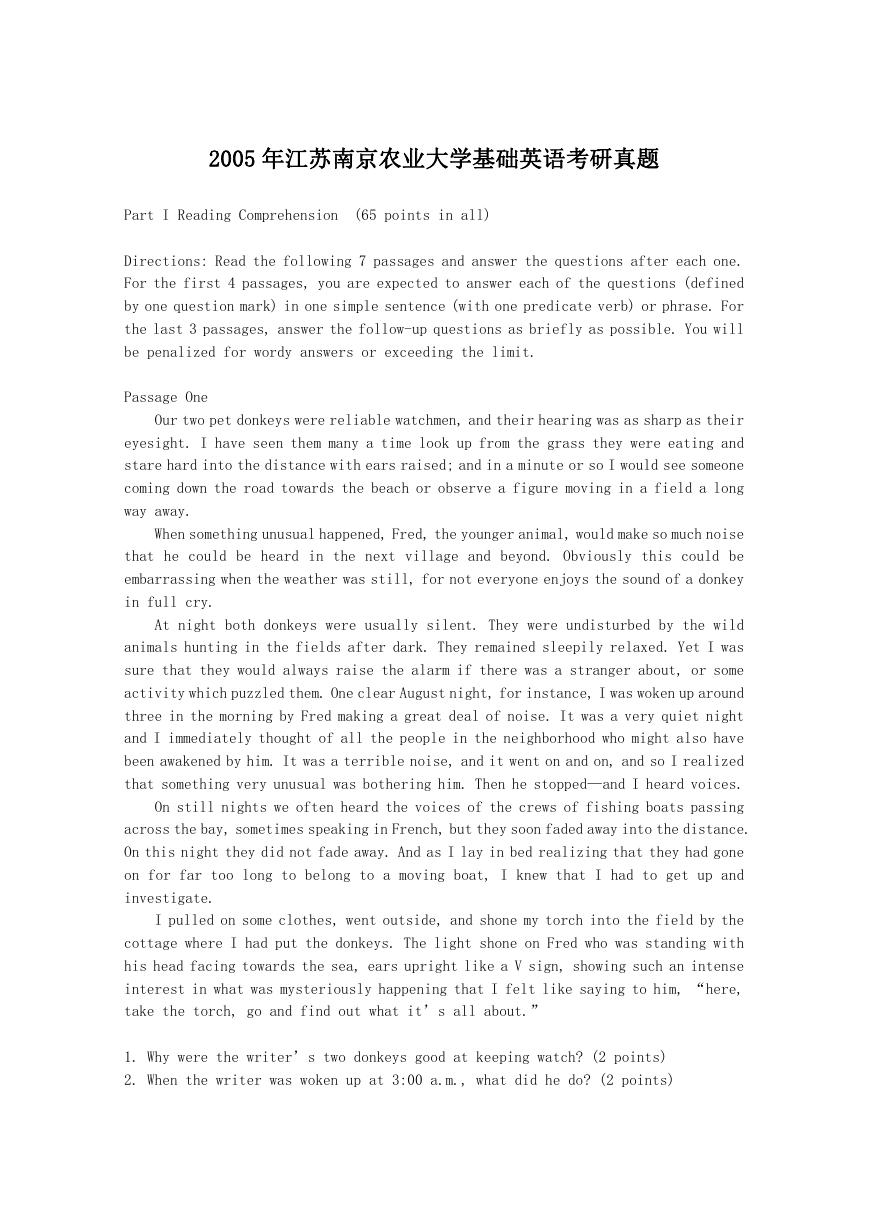
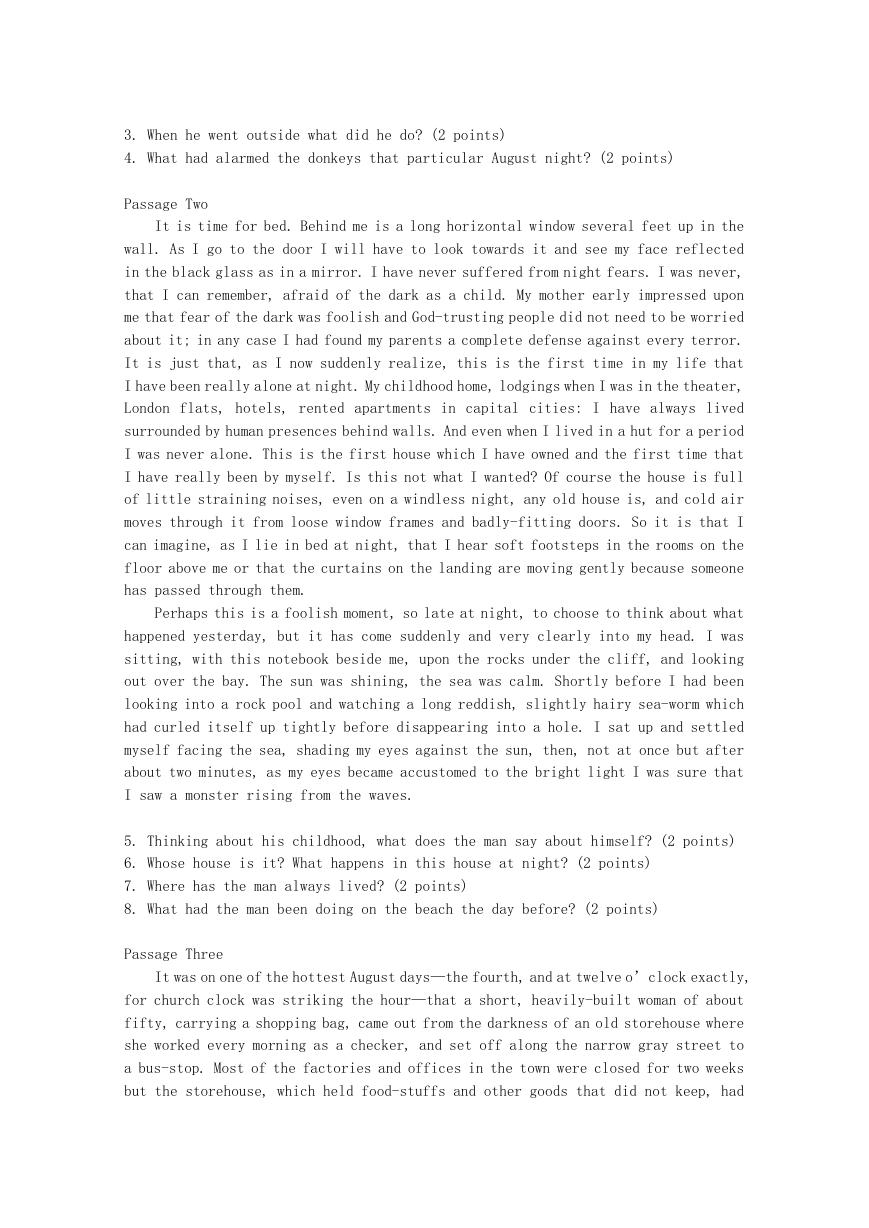
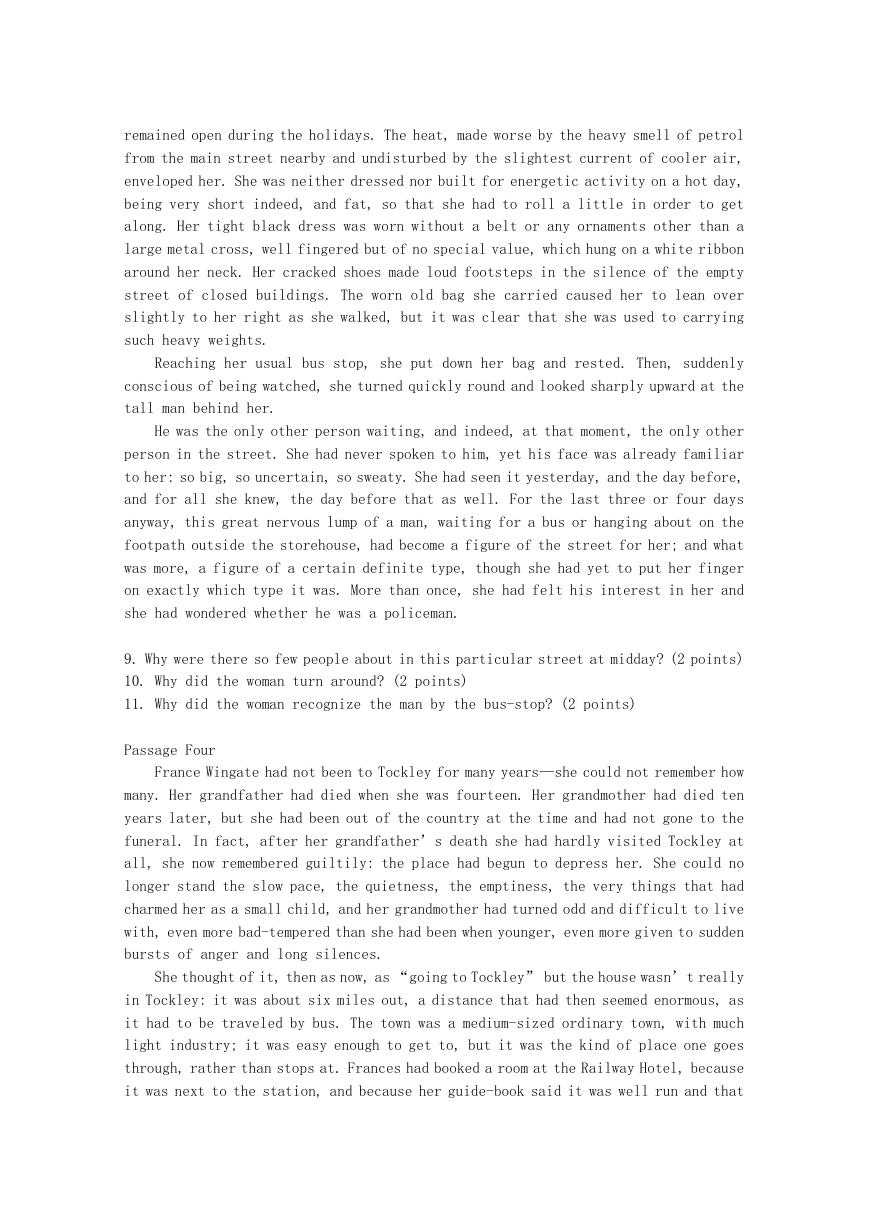
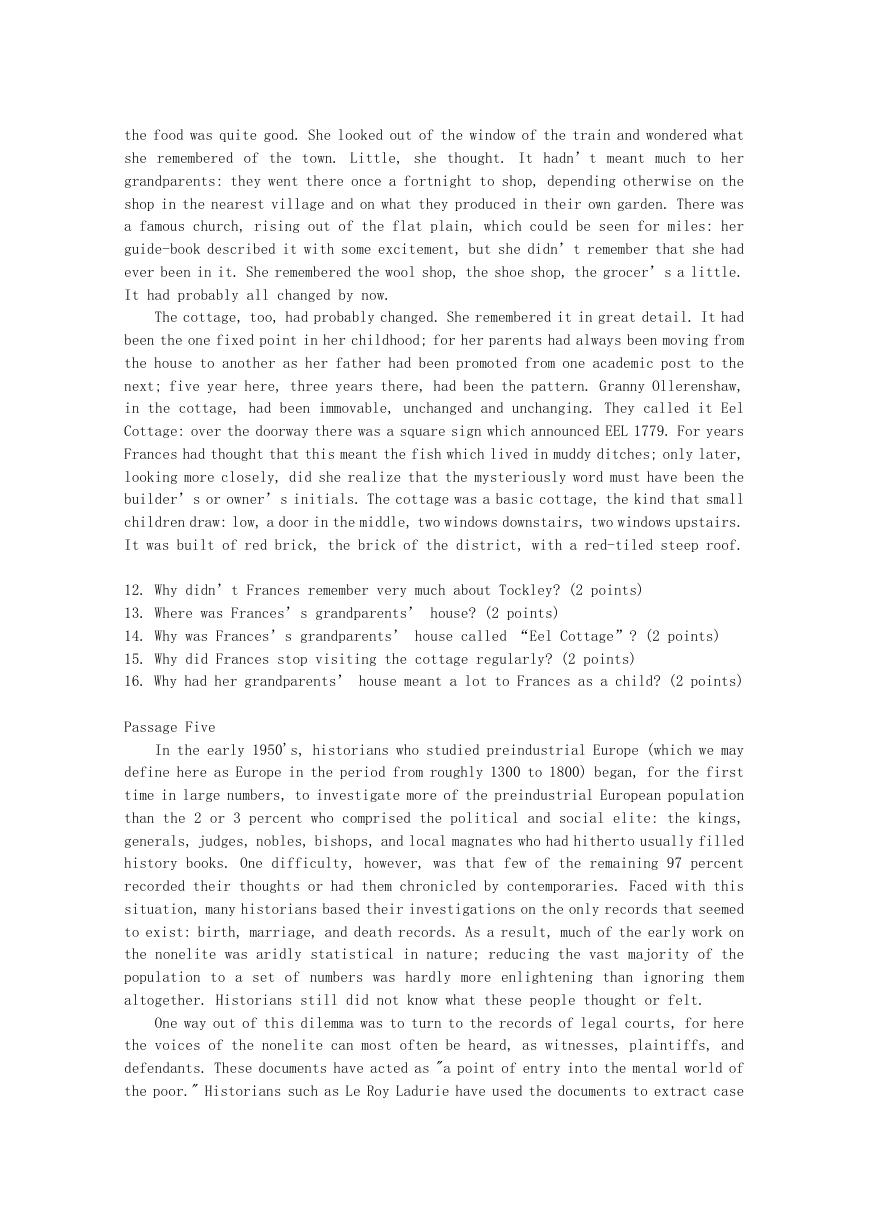
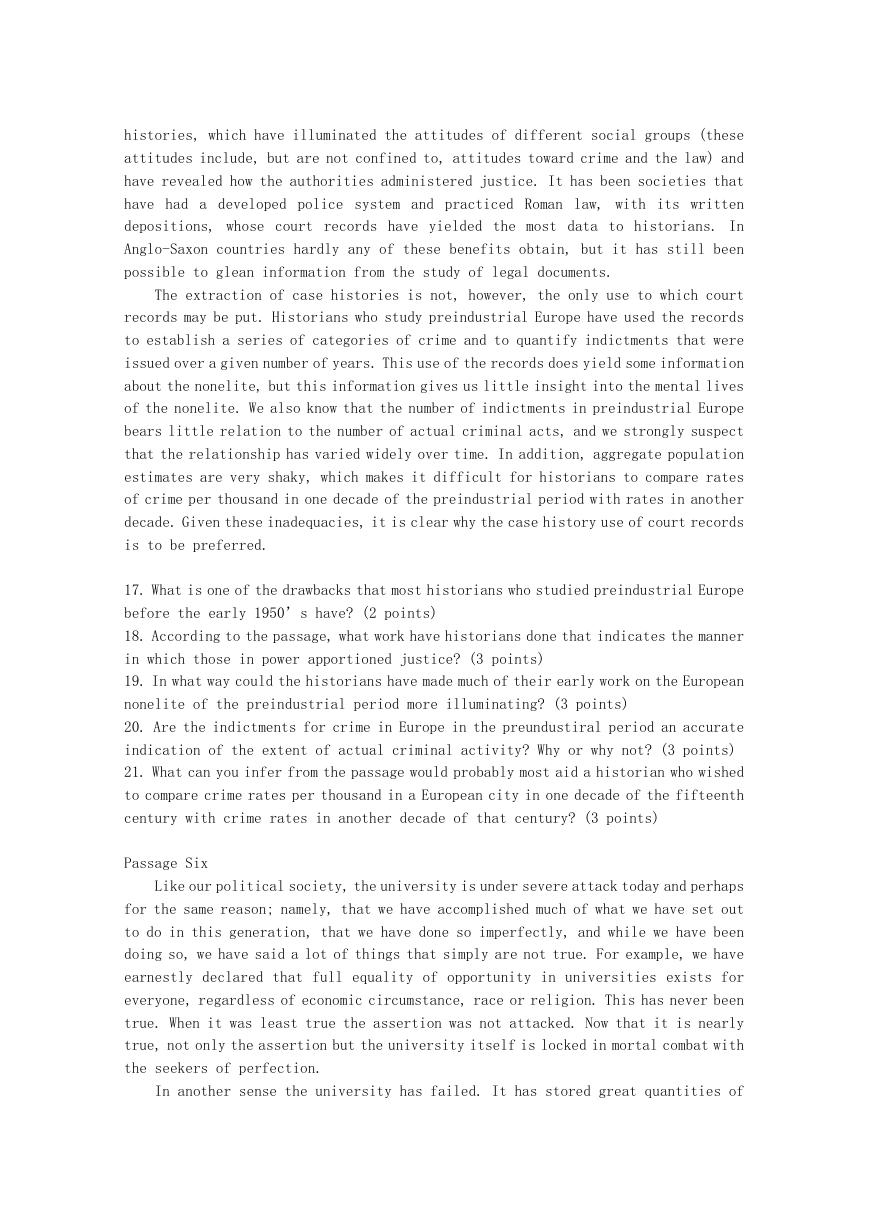
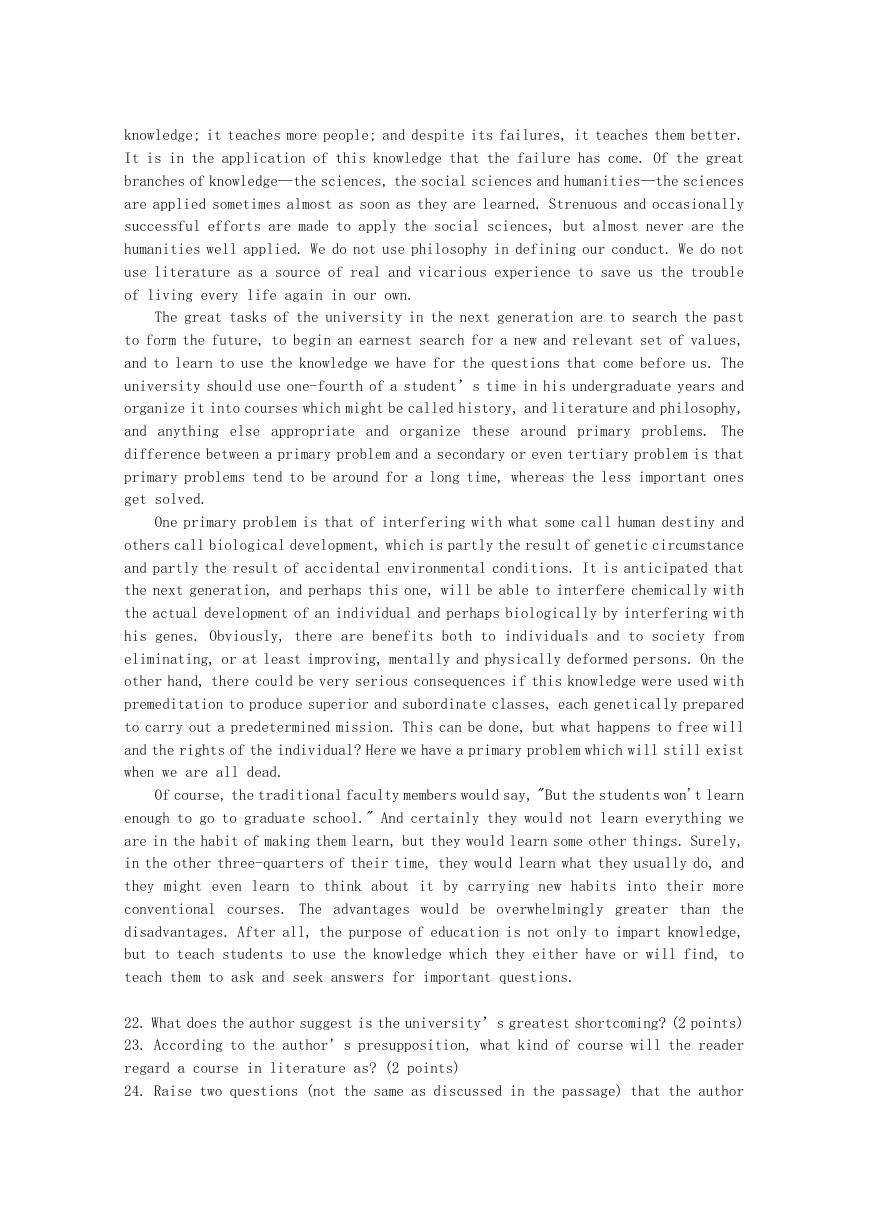
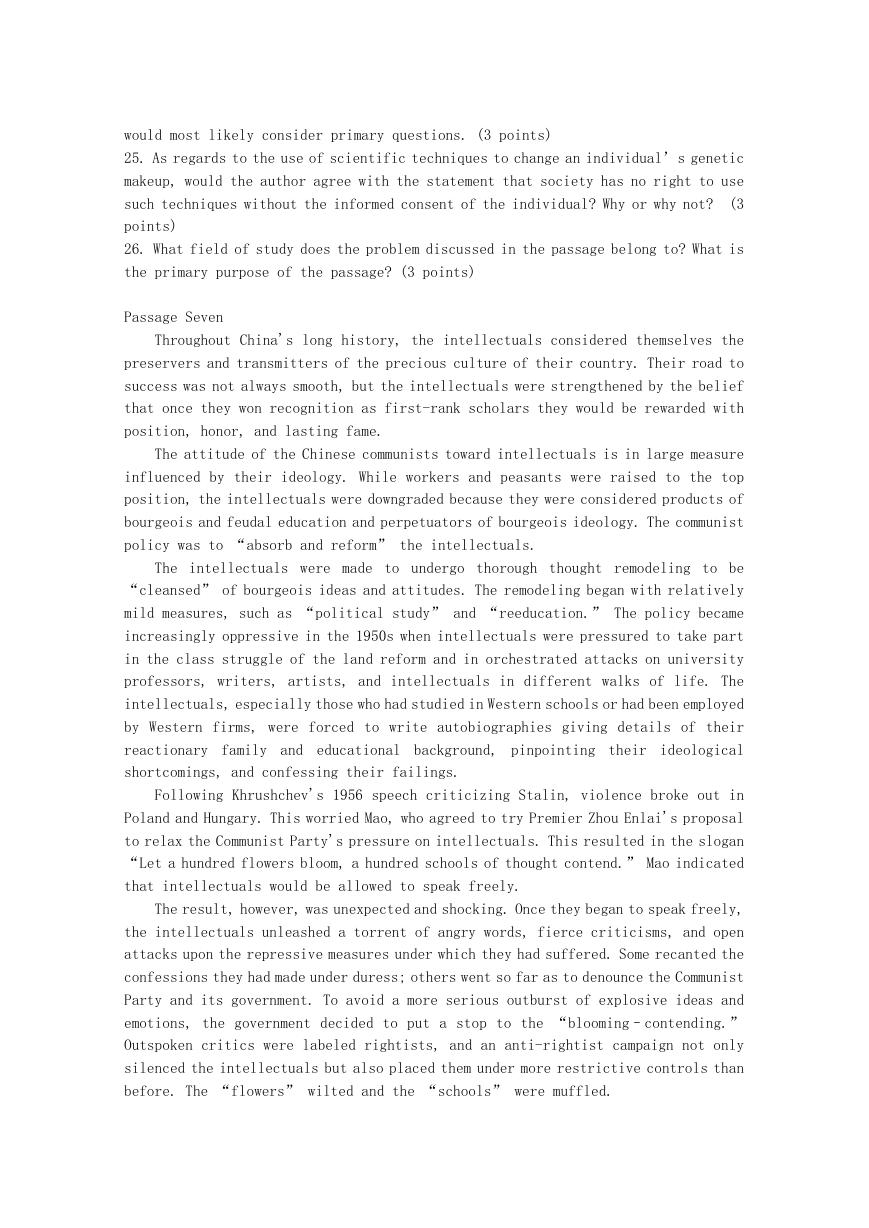
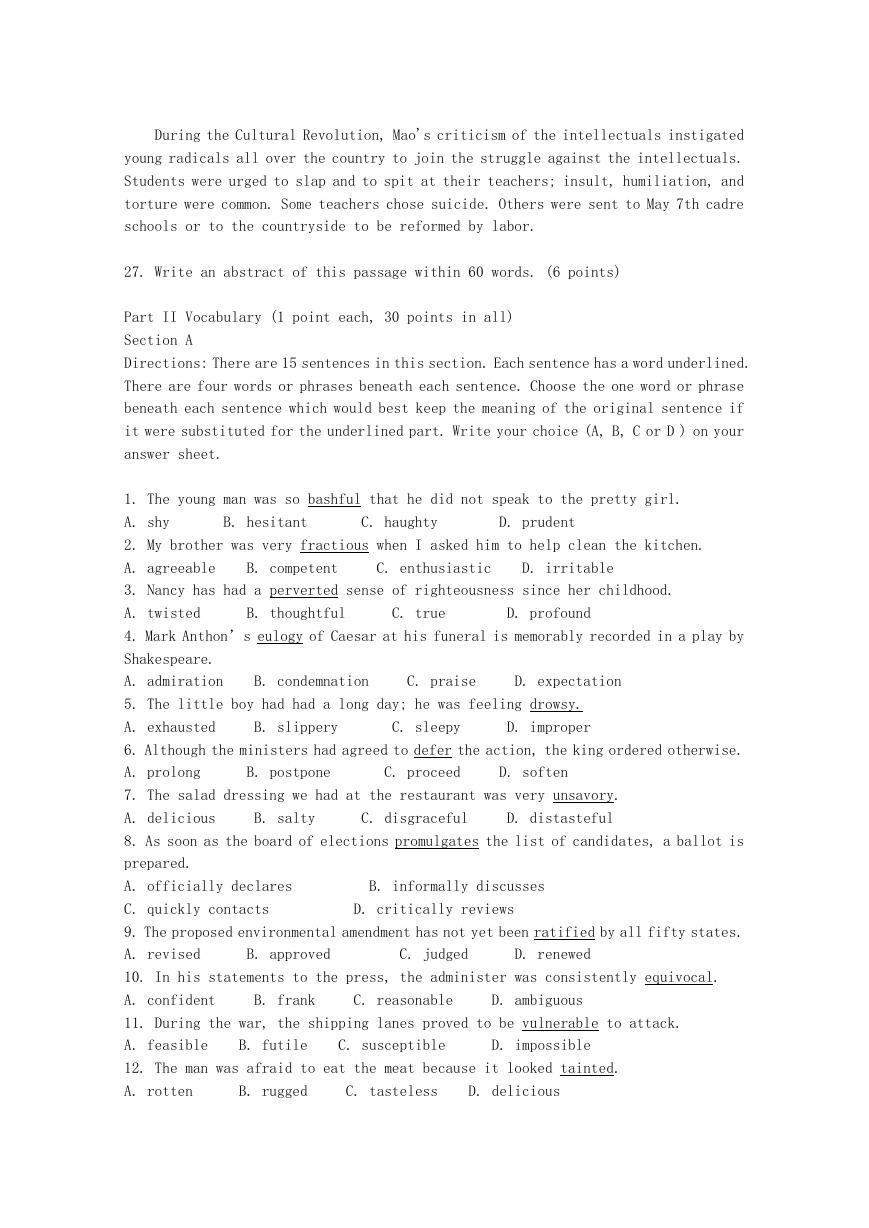








 2023年江西萍乡中考道德与法治真题及答案.doc
2023年江西萍乡中考道德与法治真题及答案.doc 2012年重庆南川中考生物真题及答案.doc
2012年重庆南川中考生物真题及答案.doc 2013年江西师范大学地理学综合及文艺理论基础考研真题.doc
2013年江西师范大学地理学综合及文艺理论基础考研真题.doc 2020年四川甘孜小升初语文真题及答案I卷.doc
2020年四川甘孜小升初语文真题及答案I卷.doc 2020年注册岩土工程师专业基础考试真题及答案.doc
2020年注册岩土工程师专业基础考试真题及答案.doc 2023-2024学年福建省厦门市九年级上学期数学月考试题及答案.doc
2023-2024学年福建省厦门市九年级上学期数学月考试题及答案.doc 2021-2022学年辽宁省沈阳市大东区九年级上学期语文期末试题及答案.doc
2021-2022学年辽宁省沈阳市大东区九年级上学期语文期末试题及答案.doc 2022-2023学年北京东城区初三第一学期物理期末试卷及答案.doc
2022-2023学年北京东城区初三第一学期物理期末试卷及答案.doc 2018上半年江西教师资格初中地理学科知识与教学能力真题及答案.doc
2018上半年江西教师资格初中地理学科知识与教学能力真题及答案.doc 2012年河北国家公务员申论考试真题及答案-省级.doc
2012年河北国家公务员申论考试真题及答案-省级.doc 2020-2021学年江苏省扬州市江都区邵樊片九年级上学期数学第一次质量检测试题及答案.doc
2020-2021学年江苏省扬州市江都区邵樊片九年级上学期数学第一次质量检测试题及答案.doc 2022下半年黑龙江教师资格证中学综合素质真题及答案.doc
2022下半年黑龙江教师资格证中学综合素质真题及答案.doc